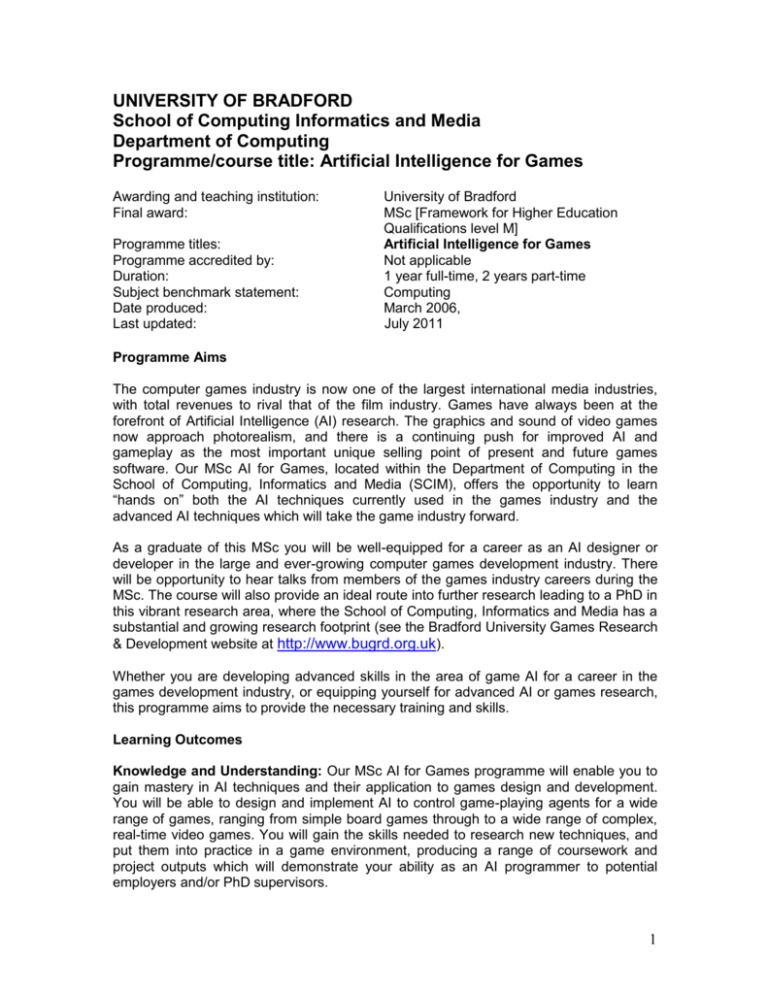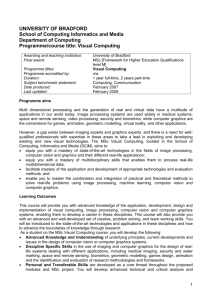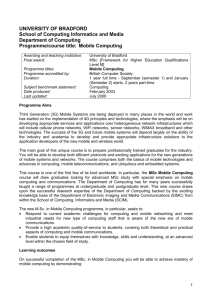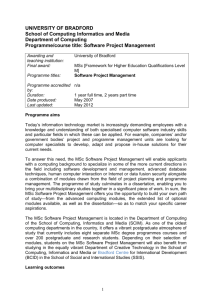MSc AI for Games
advertisement

UNIVERSITY OF BRADFORD School of Computing Informatics and Media Department of Computing Programme/course title: Artificial Intelligence for Games Awarding and teaching institution: Final award: Programme titles: Programme accredited by: Duration: Subject benchmark statement: Date produced: Last updated: University of Bradford MSc [Framework for Higher Education Qualifications level M] Artificial Intelligence for Games Not applicable 1 year full-time, 2 years part-time Computing March 2006, July 2011 Programme Aims The computer games industry is now one of the largest international media industries, with total revenues to rival that of the film industry. Games have always been at the forefront of Artificial Intelligence (AI) research. The graphics and sound of video games now approach photorealism, and there is a continuing push for improved AI and gameplay as the most important unique selling point of present and future games software. Our MSc AI for Games, located within the Department of Computing in the School of Computing, Informatics and Media (SCIM), offers the opportunity to learn “hands on” both the AI techniques currently used in the games industry and the advanced AI techniques which will take the game industry forward. As a graduate of this MSc you will be well-equipped for a career as an AI designer or developer in the large and ever-growing computer games development industry. There will be opportunity to hear talks from members of the games industry careers during the MSc. The course will also provide an ideal route into further research leading to a PhD in this vibrant research area, where the School of Computing, Informatics and Media has a substantial and growing research footprint (see the Bradford University Games Research & Development website at http://www.bugrd.org.uk). Whether you are developing advanced skills in the area of game AI for a career in the games development industry, or equipping yourself for advanced AI or games research, this programme aims to provide the necessary training and skills. Learning Outcomes Knowledge and Understanding: Our MSc AI for Games programme will enable you to gain mastery in AI techniques and their application to games design and development. You will be able to design and implement AI to control game-playing agents for a wide range of games, ranging from simple board games through to a wide range of complex, real-time video games. You will gain the skills needed to research new techniques, and put them into practice in a game environment, producing a range of coursework and project outputs which will demonstrate your ability as an AI programmer to potential employers and/or PhD supervisors. 1 Discipline Skills: You will gain mastery of AI techniques applicable to games (and other areas such as finance and engineering) such as: AI Architectures AI Design and Project Management Movement, Search and Pathfinding Tactical and Strategic Position Evaluation Genetic Algorithms and other Heuristics Artificial Neural Networks Machine Learning Personal and Transferable Skills, developed as a core thread throughout the proposed modules, requiring written and oral presentation, analysis, problem-solving, flexible specialisation, team-working and time management in a game development environment. Using these skills you will be well placed to apply for careers in the large and fastgrowing games industry, as well as careers which use AI in decision support systems in a wide variety of service and manufacturing industries, and in government. The Curriculum Typically for a taught Masters programme, our MSc AI for Games lasts for twelve months of full-time study; that is, two semesters of instruction followed by completion of a major dissertation project in the summer or 24 months of part-time study following a similar pattern. The MSc AI for Games covers a range of specialist topics, leading to the qualification of a Master's degree. Typically, a taught full-time Master's course lasts for twelve months of full-time study. The course has two stages: the taught courses stage which takes place during the first two semesters (or four semesters for the part-time route), and the project/dissertation stage. The taught courses stage is organised on a modular basis. Students who successfully complete the taught modules are eligible for the PGDip AI for Games. Students proceeding onto the Masters level undertake a project which the student has to agree with the Department during the first taught semesters Unit code Unit title CM1060D Artificial Intelligence for Games 1 CM1019D Formal Methods (PG) EM0421D Computer Animation & Special Effects CM1013D Software Project Management CM1061D Artificial Intelligence for Games II CM0518D Concurrent and Distributed Systems CM1033D Advanced Software Development CM0425D Group Project (AIFG) EM4025D Advanced Character Animation CM1044D Artificial Intelligence with Applications CM0424Z Dissertation Cr = credits; L = level; S = semester. C = core, O = optional. Cr 20 20 20 20 20 20 20 20 20 20 60 L M M M M M 3 M M M M M S 1 1 1 1 2 2 2 2 2 2 3 MSc C O O O C O O C O O C 2 Assessment regulations: a summary To be eligible for a Masters Degree, you must achieve at least 40.0% in 160 credits and 35.0% in the other 20 credits. If you achieve an overall weighted average of at least 60.0% but less than 70.0% you will be eligible for the award of the Degree of Master with Merit. If you attain an overall weighted average of at least 70.0% at the initial attempt in your dissertation, you will be eligible for the award of the Degree of Master with Distinction. To be eligible for the award of the Postgraduate Diploma, you must achieve at least 40% in 100 credits and at least 35.0% in the other 20 credits. Additionally, students who attain an overall average of at least 60.0% but less than 70.0% and those who achieve an overall average of over 70.0% at the first attempt will be eligible for the award of Postgraduate Diploma with Merit and Postgraduate Diploma with Distinction respectively. The full text of the University of Bradford’s Assessment Regulations is located at http://www.brad.ac.uk/admin/acsec/QA_Hbk/Postgrad_Taught_Regs.html. Teaching, Learning and Assessment Strategies You will experience a wide range of teaching and learning environments while studying on the MSc AI for Games programme. Concepts, principles and theories are generally explored in formal lectures, practiced in associated tutorials and seminars, and demonstrated in laboratory classes. Practical skills are developed in laboratory sessions, and professional and personal skills are implicitly developed through the course in both group work and presentations. The individual project brings all the various aspects of the course together. Laboratory work will be conducted in the School’s well-equipped computer laboratories. A variety of PC software tools will be used for teaching and learning, including bespoke AI development software which has been developed in collaboration with Microsoft. Each unit credit represents 10 hours of study, so that a 10-credit module represents 100 hours and a 20-credit module represents 200 hours. Some of these hours will be formally timetabled as lectures, laboratories, seminars and tutorials, while and others will involve you in carrying out private study. Methods of assessment are similarly varied, and your progress will be assessed using a mix of formal examinations, presentations, reports, laboratory tests, essays, coursework assignments, and projects. The appropriate method is chosen so that you may demonstrate the particular learning outcomes of each module. Since the focus of the MSc AI for Games is for you to be able to put learning into practice, practical work and coursework which allow you to use AI concepts will be emphasised in assessment. Admissions Criteria Generally, applicants are expected to possess a good Honours degree (normally 2:2 or above) in computer science, computer engineering, informatics or other computer-related subjects from an approved degree-awarding body OR 3 any subject from area relevant to the field(s) of the proposed programme of study, together with skills and relevant experience in a computer-related area such as computer programming or information systems. However, with respect to the MSc AI for Games, we also specifically require that all applicants have a good understanding of the principles and practice of writing computer programmes prior to entry, and that they: have a good Honours degree containing a significant component in Computing of an approved degree-awarding body; or have a good Honours degree in a subject other than with Computing, but can demonstrate sufficient relevant experience in Computing; and have relevant industrial experience (e.g. obtained through substantial experience of working in the Games or software industry or through industrial experience of other relevant programming work) that will be assessed via a CV and references. Candidates applying to the course with non-standard qualifications will be judged on an individual basis using the University’s APEL procedures. In addition, a test of written and spoken English normally needs to have been passed at grade 6.0 for IELTS or 550 for TOEFL (or 250 for the computer-based test) or above. Student support and guidance Students admitted to the programme will have the Department of Computing within the School of Computing, Informatics and Media as their “home” department. As such, you will go through a process of induction within Computing and SCIM. Afterwards, ongoing support for is provided in the form of one-stop facilities located at the SCIM Student Support Office (SSO) in Horton Building, open throughout the day during term, and in the mornings and afternoons outside term. Support for registered students also is provided 24/7 via the intranets of the School of Computing, Informatics and Media, Department of Computing and the School’s Technical Support. The School also uses the University’s Virtual Learning Environment (VLE) to support students via their individual modules. All students on our MSc Artificial Intelligence for Games will be allocated a Personal Tutor who provides support and guidance on matters relating to learning, teaching, and academic progress. There are tutors in the School who have specialist responsibilities, and are able to deal with specific issues relating to factors such as disability, equal opportunities and gender. Further Information More details about our MSc AI for Games may be obtained from the School of Computing, Informatics and Media Admissions Office via telephone on +44 (0)1274 235963, email pgadmissions@bradford.ac.uk, or our website at www.scim.brad.ac.uk/courses/pg/ If you require further information about the University of Bradford, please refer to its Postgraduate Prospectus. Disclaimer The details of this Programme Specification and information contained therein are subject to change in accordance with the University of Bradford’s course approval, monitoring and review procedures. 4











